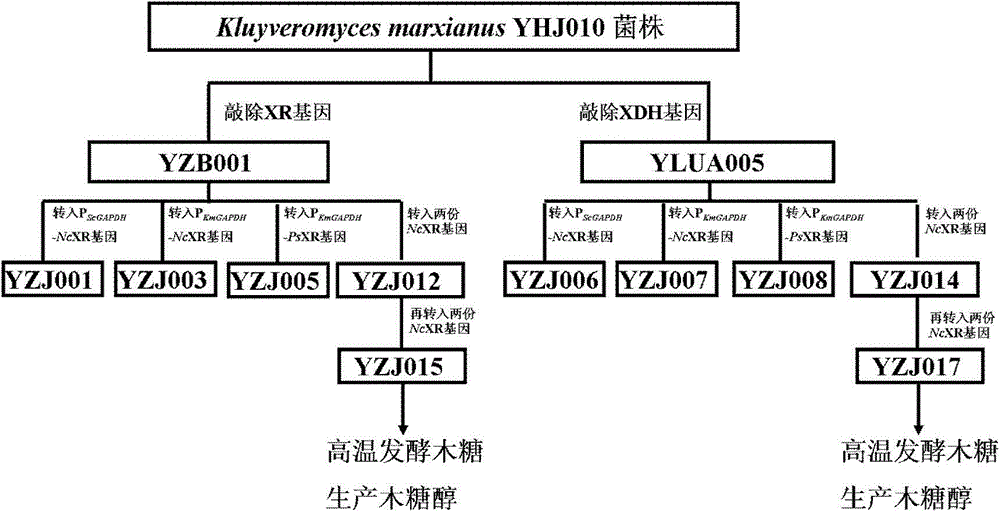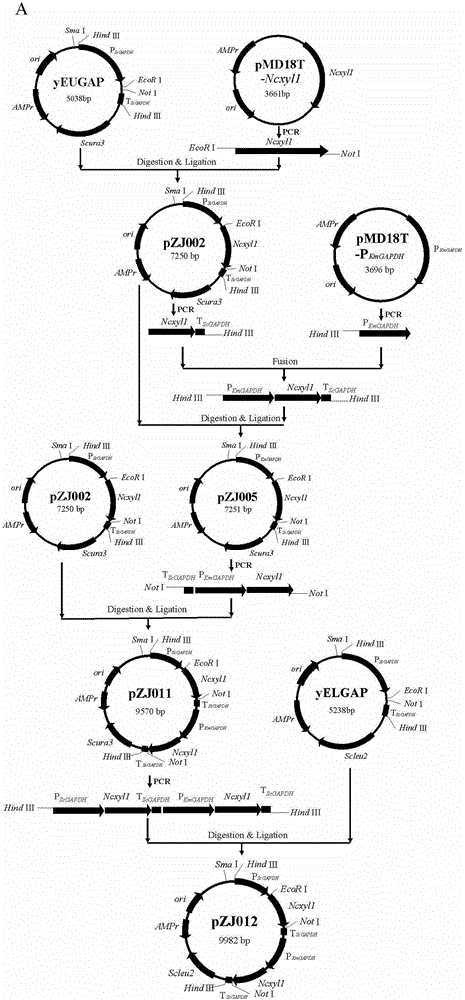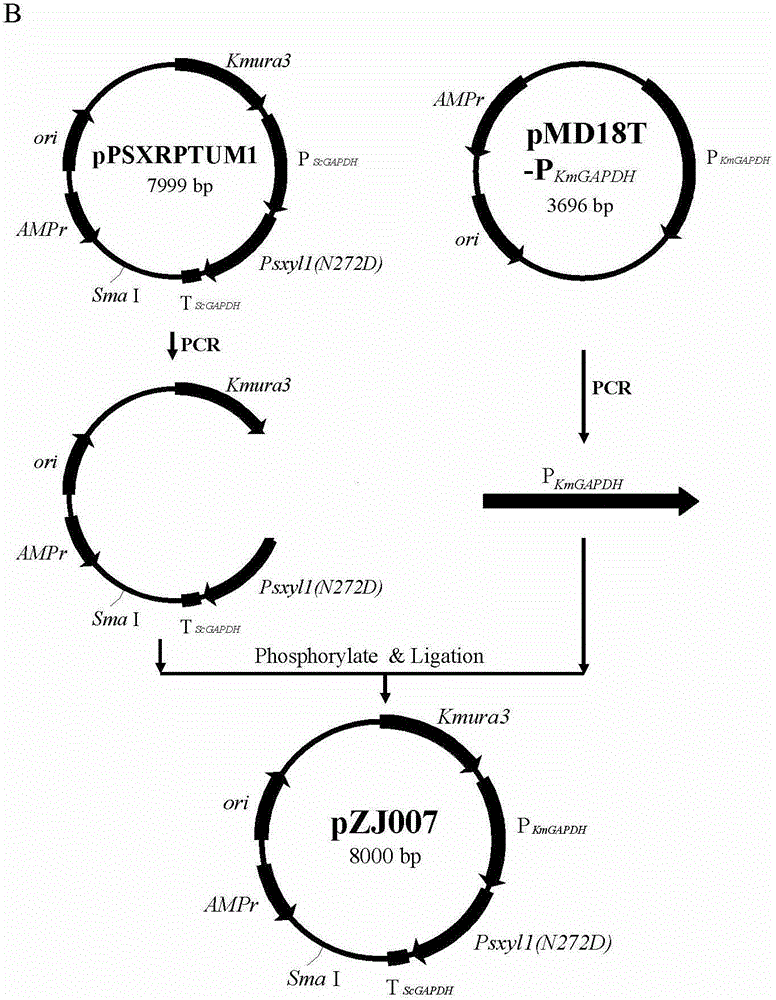Construction and application of high-temperature high-yield xylitol engineering strains
A xylitol, engineering technology, applied in the direction of fungi, microorganism-based methods, using vectors to introduce foreign genetic material, etc., can solve the problems of low xylitol concentration and efficiency, low rate, and production rate of only 0.24g
- Summary
- Abstract
- Description
- Claims
- Application Information
AI Technical Summary
Problems solved by technology
Method used
Image
Examples
Embodiment 1
[0071] Embodiment 1. Preparation of bacterial strains:
[0072] 1. Acquisition of various XR genes:
[0073] 1). Acquisition of NcXR gene (Woodyer et al., 2005):
[0074] The genome of Neurospora 74-OR23-1VA (purchased from Fungal Genetics Stock Center 2489, School of Biological Sciences, University of Missouri, Kansas City) was extracted, and the extracted genome of Neurospora was diluted 100 times as a template, and PrimeSTAR HS DNA was polymerized Enzyme (Dalian Baobiology) and NCXR-F1 (SEQ ID No.1), NCXR-R2 (SEQ ID No.4) primers for PCR, the product obtained is the NcXR gene (SEQ ID No.21 ), and insert the gene into the pMD18-T vector (Dalian Baobiology). Since the NcXR gene has introns, the T vector inserted into NcXR was used as a template, and PrimeSTAR HS DNA polymerase and NCXR-F1 (SEQ ID No.1), NCXR-R1 (SEQ ID No.2), NCXR- F2 (SEQ ID No.3), NCXR-R2 (SEQ ID No.4) primer PCR exon gene respectively, then fusion, obtain the exon gene fusion fragment of NcXR, clone aga...
Embodiment 2
[0267] Example 2. Fermentation of strains containing different promoters and XR genes under synthetic medium
[0268] This example is used to compare the effects of different XR genes and different promoters on the production of xylitol. The results showed that the effect of NcXR gene on producing xylitol was better than that of PsXR, and the promoter P ScGAPDH and P KmGAPDH Little effect, but with P KmGAPDH The effect is slightly better.
[0269] 1. Recover strains on YPD medium plates. Control strains: YZB001, YLUA005. Experimental strains: YZJ001, YZJ003, YZJ005, YZJ006, YZJ007, YZJ008. Cultured at 37°C for 1 day.
[0270] 2. Pick out single clones respectively, and connect them to 5ml liquid YPD medium. 37°C, 250rpm, overnight.
[0271] 3. Prepare 39 bottles of 50ml xylose synthesis medium and distribute them in 250ml Erlenmeyer flasks. Formula: 50g / L xylose, 10g / L yeast extract, 20g / L bacteriological peptone, 10g / L glycerin. Sterilized and ready to use.
[0272]...
Embodiment 3
[0279] Example 3. Fermentation of strains containing different copies of the NcXR gene at 42°C
[0280] This example is used to understand the comparison of the fermentation of strains containing different copies of the NcXR gene under high temperature (42° C.) conditions with the fermentation of strains containing one copy of the NcXR gene. The results prove that increasing the NcXR copy can make Increased fermentation capacity.
[0281] 1. Recover strains on YPD medium plates. Control strains: YZJ003, YZJ007. Experimental strains: YZJ012, YZJ014, YZJ015, YZJ017. Cultured at 37°C for 1 day.
[0282] 2. Pick out single clones respectively, and connect them to 5ml liquid YPD medium. 37°C, 250rpm, overnight.
[0283] 3. Prepare 27 bottles of 30ml xylose synthesis medium and pack them in 250ml Erlenmeyer flasks. Formula: 50g / L xylose, 10g / L yeast extract, 20g / L bacteriological peptone, 15g / L glycerol 50g / L xylose, 15g / L glycerin, 10g / L yeast extract, 20g / L bacteriological pe...
PUM
 Login to View More
Login to View More Abstract
Description
Claims
Application Information
 Login to View More
Login to View More - R&D
- Intellectual Property
- Life Sciences
- Materials
- Tech Scout
- Unparalleled Data Quality
- Higher Quality Content
- 60% Fewer Hallucinations
Browse by: Latest US Patents, China's latest patents, Technical Efficacy Thesaurus, Application Domain, Technology Topic, Popular Technical Reports.
© 2025 PatSnap. All rights reserved.Legal|Privacy policy|Modern Slavery Act Transparency Statement|Sitemap|About US| Contact US: help@patsnap.com



